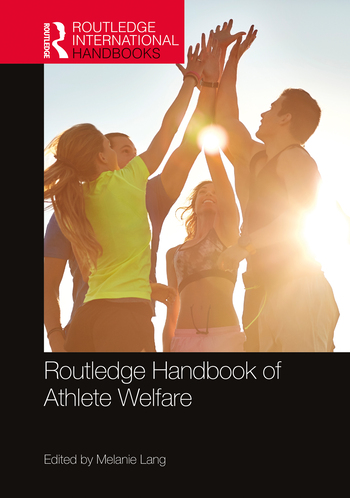
At a time when abuse and maltreatment in sport have featured heavily in national and international headlines, Dr Melanie Lang, assistant director of The Centre for Child Protection and Safeguarding in Sport (CPSS), hosted a successful public event on understanding and developing athlete welfare on 9 November 2020.
The event, which was supported by the Institute for Social Responsibility (ISR), was timed to celebrate Dr Lang’s latest book, The Routledge Handbook of Athlete Welfare. The event featured presentations from four speakers and was opened by Professor Jo Crotty, Director of the ISR.
The free online event was attended by athletes, academics, and safeguarding and welfare in sport policymakers and professionals from organisations including national governing bodies of sport, the Ann Craft Trust, and the International Centre for Ethics in Sport in Belgium. Delegates were drawn from the UK, Belgium, Cyprus, Sweden, and Spain.
In the first presentation, Dr Lang called for more resources to be directed towards non-sexual forms of abuse in sport. Highlighting research that indicates emotional abuse is the most prevalent form of abuse in sport yet the least likely to be reported, Dr Lang argued that sports organisations must do more to raise awareness of and act on this form of abuse. Dr Lang provided examples of how athletes can be empowered to speak out about abuse and what sports organisations can do to better respond to under-recognised forms of abuse.
In the second presentation, Dr Geoff Kohe from the University of Kent and CPSS member and Edge Hill University senior lecturer Dr Laura Purdy discussed care ethics in sport. They highlighted how a particular narrow conceptualisation of care has become normalised in sport, arguing this restricts understandings of welfare. Drs Kohe and Purdy advocated for a broader understanding of athlete welfare and more nuanced conceptualisations of care that are more responsive to athlete needs.
Finally, Professor Hayley Fitzgerald of Leeds Beckett University and the University of Worcester discussed the welfare of disabled people in sport. Professor Fitzgerald noted that research focusing on safeguarding in sport in relation to disability is rare, and that what little is known has tended to come from studies that investigated welfare issues in the general sport population rather than specifically exploring the experiences of disabled participants. Professor Fitzgerald argued that an embedded approach is needed whereby issues of disability are infused within generic safeguarding approaches rather than disabled athletes being treated as a separate category of concern.
The event concluded with a lively discussion between delegates and panellists on a range of welfare issues affecting athletes and other sport stakeholders.
